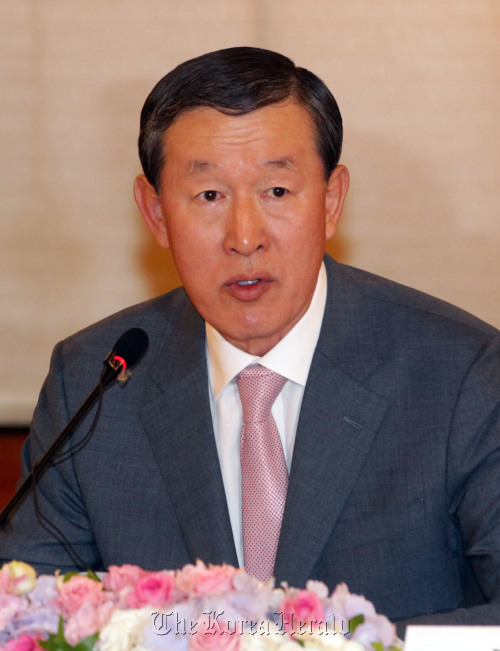Huh had secret meeting with ex-P.M. Chung over ‘profit-sharing’
The head of the Federation of Korean Industries has expressed his opposition to a ruling party move to scrap the tax reduction plan.
Speaking at a press conference Tuesday, FKI chairman Huh Chang-soo, who is also GS Group chairman, said he opposes the plan because he believes companies can invest more when they have the means to do so.
But the head of the FKI, the nation’s largest business lobby group, refrained from commenting on the controversial profit-sharing program, which is being pushed by a government committee on shared growth, led by former Prime Minister Chung Un-chan.
 |
FKI chairman Huh Chang-soo |
The FKI has repeatedly opposed the proposal, saying the excess profit sharing program alone was anti-market.
Huh said he had nothing to comment on the program, but added that he saw the government’s business-friendly policies to be unwavering.
Last week, Chung met with Huh reportedly to narrow differences between the committee and the business circle.
In the closed meeting, Chung stressed that he would implement the program only when companies are ready to voluntarily make the commitment.
On Tuesday, Chung proved that he would continue to adhere to his profit-sharing scheme.
Chung told a lecture at the Hansun National Strategy Forum that a better program would actually call for companies to share all their sales revenues and net profit but that he was forced to start with a plan where companies only share excess profit.
“I believe it is more desirable to start with excess profit sharing, which is the lowest level of profit sharing, and move on to higher levels of profit sharing as South Korea is only beginning to develop a culture of shared growth,” he said.
The so-called profit sharing program proposed by Chung earlier this year aroused much controversy in local business circles, and even in the political arena.
Korea Economic Research Institute, a local think tank affiliated with the FKI, last week said in a report that profit-sharing scheme was capable of “undermining the very foundation of capitalism by violating the legitimate claims (of businesses).”
By Kim Ji-hyun (
jemmie@heraldcorp.com)








